Belgium, known for its rich history, stunning architecture, and high living standards, presents an attractive proposition for property investment. One of the most compelling aspects for international buyers considering buying property in Belgium as a foreigner is the absence of restrictions on property ownership for non-residents, making the buying process seamless and straightforward.
Around 71.3% of Belgians are homeowners, considerably higher than the European Union average of 64.3%1. This high homeownership rate is driven by factors such as property affordability and favorable mortgage conditions. The average price of a house in Belgium was €323,031 in the first quarter of 2023, while an apartment averaged at €264,1391. These prices are relatively affordable compared to neighboring countries.
When considering buying property in Belgium as a foreigner, it’s important to be aware of the transaction costs involved. Registration fees are one of the notable expenses, varying by region: 6% in Flanders, and 10% in other regions for properties older than two years1. Additionally, VAT on new properties built within the last two years stands at 21%1. Notary costs average around 1.6% of the purchase price, and agency fees range from €200 to €1,0001.
Belgium’s housing market is also appealing because of its equitable conditions for both residents and non-residents. While international buyers purchasing property in Belgium face no restrictions, different tax implications apply based on residency status. For instance, the tax rules for non-residents purchasing property are tied to the property’s location rather than the buyer’s nationality2.
Key Takeaways: How to Buy a Property in Belgium
- 71.3% of Belgian residents are homeowners, higher than the EU average1.
- There are no restrictions on foreigners buying property in Belgium
- Average property prices: €323,031 for houses and €264,139 for apartments1.
- Transaction costs include registration fees (6% in Flanders, 10% in other regions)1 and VAT on new properties (21%)1.
- Different tax rules apply for residents and non-residents2.
Contact us if you are Interested in Buying Property Abroad!
Understanding Property Ownership Rules for Expats in Belgium
Expats and non-citizens owning real estate in Belgium have easier access to housing compared to many other European countries. The property ownership rules for expats in Belgium accommodate buyers with various property preferences including off-plan homes, new builds, and furnished apartments, granting them the same legal rights as Belgian citizens
Homeownership in Belgium
Homeownership in Belgium is substantial, with about 71.3% of residents owning their homes, which is higher than the EU average of 64.3%3. Non-citizens will find a welcoming housing market with no restrictions on buying residential properties, although some limitations exist for agricultural land. The trend of property prices in Brussels being higher than the national average, contrasted with more affordable options in Wallonia, provides varied opportunities for investment4. Additionally, potential property buyers should consider the property prices per square meter for new dwellings, which averages around €2,871 in Belgium3.
Legal Rights for Foreign Buyers
Belgium offers robust legal frameworks ensuring that foreign buyers enjoy equivalent rights to Belgian citizens. Expats can purchase properties without encountering significant bureaucratic hurdles, as the regulations for non-resident property buyers are straightforward. Around 33% of people in Belgium are property owners with outstanding mortgages, illustrating that access to finance is a central factor in this housing market5. Moreover, expats must be vigilant about additional responsibilities such as tax implications and compliance with local market trends to optimize their property investments.
renting versus buying in Belgium
should be carefully evaluated based on individual circumstances including the duration of stay and financial considerations. The decision to buy or rent in Belgium is influenced by the subdued rental market, with only about 30% of the population renting properties5. Additionally, the country’s legislation requires landlords to provide tenants with at least six months’ notice before eviction5, making the rental landscape relatively secure for tenants.
Can Foreigners Buy Real Estate in Belgium?
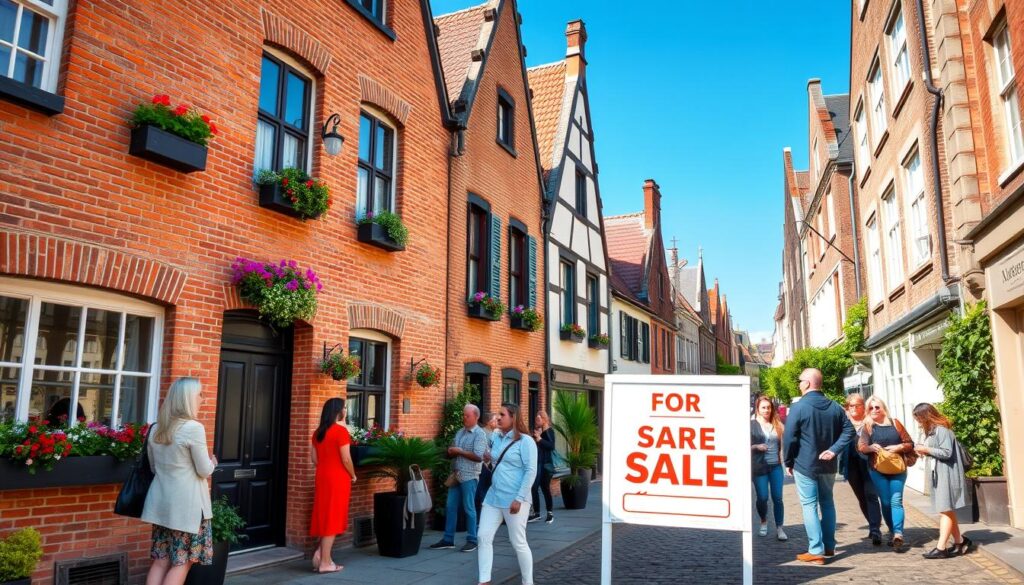
Foreign nationals, including expats, enjoy unrestricted rights to purchase a range of properties from commercial buildings to residential units in Belgium. This is due to the country’s legal framework, which ensures a level playing field, negating the need for minimum investment thresholds for property acquisition by non-residents6. Therefore, foreigners investing in Belgian property can rest assured knowing that their rights are similar to those of local citizens6.
For those wondering, “Can foreigners buy real estate in Belgium?” the answer is a resounding yes. There are no restrictions on owning real estate in Belgium, nor are there legal caps on the number of properties one can own6. This includes both residential and commercial properties, making Belgium an attractive destination for international property investors6.
An interesting aspect is the flexibility provided to American citizens, who can purchase property under the same conditions as Belgian citizens6. Whether it’s land on the border, a charming coastal house, or an urban apartment, there are no restrictions on location6. Similarly, there are no specific limits on owning land for commercial purposes, making it feasible for entrepreneurs to set up businesses or expand existing operations in Belgium6.
It’s also worth noting that non-EU nationals, including Americans, must adhere to separate residency and visa requirements if they plan to stay for extended periods. Owning property alone does not grant any residency rights in Belgium6. Instead, longer-term stays require appropriate documentation and adherence to Belgium’s immigration processes6.
Apart from ownership rights, another vital consideration is that foreigners investing in Belgian property can access local mortgages, subject to meeting financial requirements6. Lenders may impose their criteria, but the lack of legal restrictions on lending for real estate purchases ensures that foreign companies and individuals have opportunities to finance their investments7.
In summary, the attractive prospects for foreigners investing in Belgian property reflect a dynamic and inclusive market that accommodates international buyers without imposing unnecessary restrictions. With the right legal advice and thorough planning, the process of property acquisition in Belgium can be a straightforward and rewarding endeavor for foreign investors.
The Process of Buying Property in Belgium for International Buyers

International buyers purchasing property in Belgium will find the process well-structured, although it involves several key steps to ensure compliance with legal requirements. Understanding these steps can facilitate a smoother experience as you navigate the Belgian real estate market.
Key Steps in the Purchase Journey
The journey begins with identifying the desired property, which may include residential or commercial spaces, as well as land for development8. Once a property is selected, the potential buyer makes an offer. If accepted, a preliminary sale agreement, known as the compromis de vente, is signed. At this stage, a deposit, typically 10% of the purchase price, is paid3.
Securing financing is a crucial step, and Belgian banks often approve mortgage loans for foreign buyers, albeit with varying terms9. Conducting a thorough property investigation through a survey is recommended to uncover any issues. The national average property price per square meter in Belgium is €2,871, which is relatively lower compared to neighboring countries like France and Germany3.
The final stage involves the completion of legal aspects through a notary, who drafts and executes the deed of sale8. The notary registers the change of ownership with the Belgian Land Registry to finalize the property transfer9.
Role of Notaries and Legal Procedures
Notaries play a significant role in the process of buying property in Belgium, ensuring all legal compliance requirements are met. They handle the drafting and execution of the deed of sale, providing an essential service for both residential and commercial property transactions. Not correct. Correct: Notary fees in Belgium range from 1% to 2.5% of the purchase price, with registration fees around 10%8.
Additionally, potential homeowners should account for extra costs such as survey fees, mortgage fees, and insurance costs, all of which can affect the overall expenses8. It is advisable to consult the Royal Belgian Notariat Federation’s website for detailed estimates of notary fees.
A cooling-off period of seven days applies after signing the compromis de vente agreement, during which the buyer can withdraw without penalty8. Non-residents might face different tax rates and regulations compared to Belgian residents, which should be considered when planning the purchase8.
By understanding and following these steps, international buyers purchasing property in Belgium can navigate the complexities of the process with greater ease and confidence.
Costs and Taxes Associated with Buying Property in Belgium
When buying property in Belgium, prospective buyers need to be aware of the various costs and taxes associated with the process. Understanding these elements is crucial for budgeting accurately and avoiding surprises.
Registration Taxes
Registration taxes are a significant part of the cost when purchasing Belgian property. These taxes can vary depending on the property’s location and type. Typically, the standard registration duty in Belgium is 12.5%, but if you are purchasing modest housing in the Walloon Region, this rate can be reduced to either 5% or 6%10.
The specific municipalities listed as areas with real estate pressure have different maximum cadastral income limits, which can affect eligibility for reduced registration duty. Buyers should note that ownership of another immovable property intended for residential purposes could disqualify one from the reduced duty10.
VAT for New Properties
For those opting to purchase new properties, it is important to consider the VAT for new properties, which stands at 21%. This replaces the registration taxes for new builds and can represent a substantial cost. It’s essential to account for this VAT in your budget planning10.
Ongoing Property Taxes
Once the property acquisition is complete, owners must also be aware of ongoing property taxes. These taxes are based on the estimated rental value of the property and typically range between 1.25% and 2.5%. Keeping in mind these ongoing costs is crucial for long-term financial planning10.
Overall, evaluating the costs and taxes associated with buying property in Belgium, including VAT for new properties and ongoing property taxes, is essential. For more detailed insight into the purchase process and additional considerations, you can explore this guide on buying property in Belgium.
Obtaining a Belgian Mortgage as a Foreign Investor
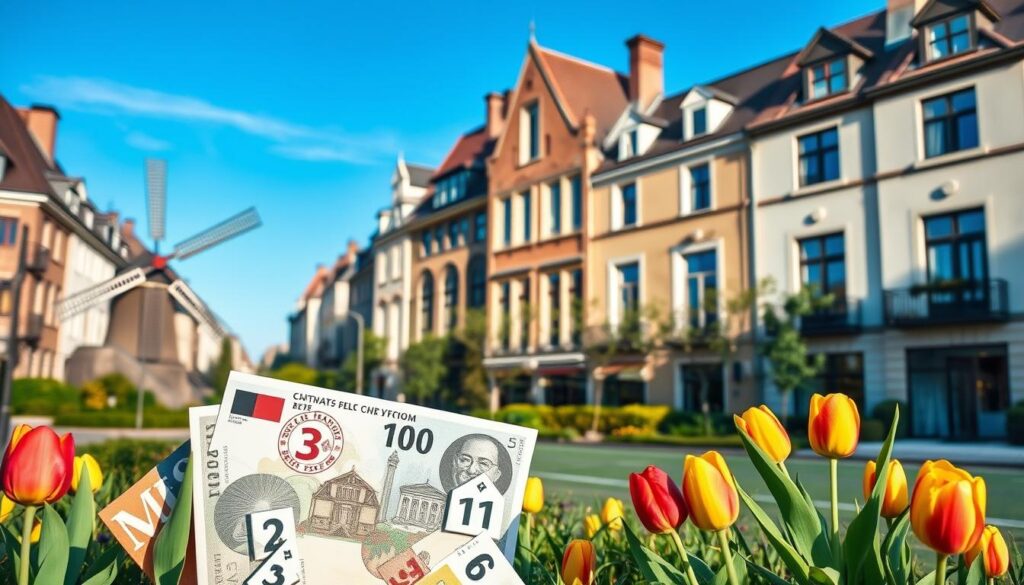
Securing a mortgage is a pivotal step for international buyers looking to invest in Belgium’s thriving real estate market. Understanding the eligibility criteria, types of mortgages available, and the thorough application process will ensure a smooth experience.
Eligibility Criteria
When obtaining a Belgian mortgage as a foreign investor, several eligibility criteria come into play. Lenders typically evaluate the financial status of the applicant, ensuring that the borrower has a stable income and can manage the mortgage repayments. Additionally, a minimum down payment of 10% is often required, emphasizing the importance of financial preparedness.
Types of Mortgages Available
Belgian lenders offer a range of mortgage options to cater to diverse investor needs. These include both fixed and variable rate mortgages, which can span over various terms, providing flexibility to align with individual investment strategies. Many of these mortgages also allow for potential tax relief, making them attractive options for international buyers.
Application Process
The application process for a Belgian mortgage involves several meticulous steps. It begins with property valuation, ensuring an accurate assessment of the investment’s worth. Subsequently, obtaining building insurance is necessary to protect the asset. Throughout the application, various administrative costs, including notarial fees, are borne by the borrower. This comprehensive process is designed to safeguard both the lender and the investor, promoting transparency and due diligence.
For more detailed and specific information on the real estate market and investment opportunities in Belgium, you can refer to this comprehensive guide11.
- Foreign investors in Belgium face no restrictions when acquiring property11.
- Asset deals must be completed by a deed executed in the presence of a notary within four months of the initial agreement11.
Contact us if you are Interested in Buying Property Abroad!
The Belgian Real Estate Market: Trends and Insights
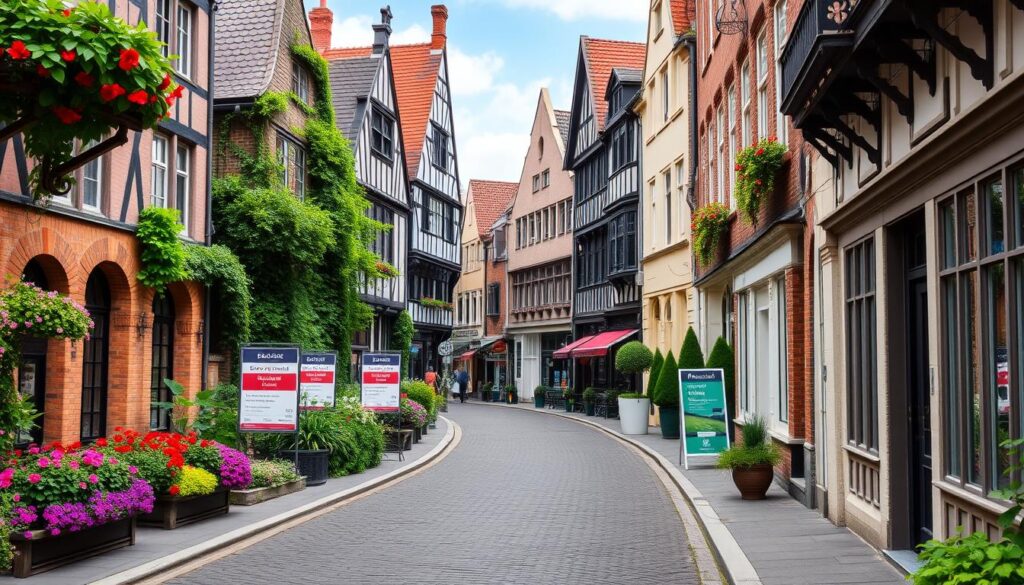
The Belgian real estate market has exhibited remarkable resilience over the past several years, with prices consistently rising since mid-2014 and projections indicating sustained growth in the future12. Several key trends have emerged that significantly influence investment decisions and market dynamics.
Market Performance and Price Trends
Analyzing market performance and price trends reveals that property valuations continue to climb, influenced by various factors such as investor sentiment and economic stability12. Recent surveys show high investor interest in Belgian real estate assets with genuine value-add potential, contributing to increased prices12. Furthermore, maintenance and repair costs, financing costs, and property taxes remain pivotal tax-deductible expenses for Belgian real estate companies, impacting overall market performance13.
Sustainable initiatives like the Brussels government’s Regional Air-Climate and Energy Plan also play a critical role in shaping market trends by reducing greenhouse gas emissions and enhancing building standards14. The introduction of legal requirements in Flanders for improving indoor air quality in public spaces aligns with broader efforts to make the market more sustainable, which could influence long-term price trends14.
Regional Variations in Property Prices
The Belgian real estate market demonstrates notable regional disparities in property prices. The Brussels-Capital region, for instance, has witnessed significant price increments, driven by high demand and limited supply12. Urban areas like Ixelles command higher property valuations, reflecting the premium placed on central locations12. In contrast, regions like Viroinval offer more affordable options, highlighting the diverse landscape of investment opportunities across Belgium.
Additionally, the Walloon Government’s proposed reform of the environmental permit system is expected to extend the duration of permits and strengthen environmental protection, which could further affect property prices and market dynamics14. Meanwhile, Flanders’ regulations on electric vehicle incentives are anticipated to bolster real estate market growth in certain areas due to the increased need for charging infrastructure12.
For those interested in a comprehensive guide, detailed insights on the Belgian real estate market can be explored on 20countries.com, covering various aspects from buying processes to future forecasts12.
Popular Belgian Cities for Property Investment
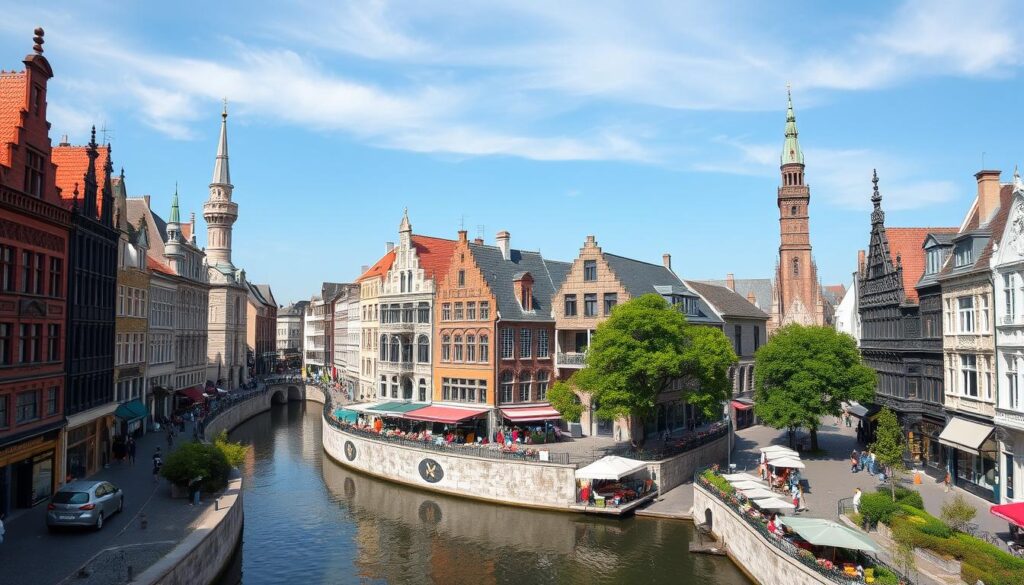
Belgium is a haven for real estate investors, offering rich opportunities across its various cities. The popular Belgian cities for property investment each provide unique advantages and cater to diverse investor preferences. Let’s explore some of these vibrant cities and see what they have to offer.
Brussels
The capital city of Belgium, Brussels, is renowned for its international appeal and bustling real estate market. Known for its historic landmarks and political significance, Brussels real estate is a prime choice for both local and foreign investors. Notably, Brussels offers a relatively lower cost of property investment compared to other European capitals, while still promising significant returns15. The city is expected to see an increment in property values, with a forecasted 0.7% boost in buying power over the next year15. For buyers looking for an urban experience with rich cultural and historical undertones, Brussels stands out as a top pick.
Antwerp
Antwerp, Belgium’s second-largest city, is another highly sought-after location for property investment. The Antwerp property market is characterized by its commercial vibrancy, being a global hub for the diamond trade and renowned for its fashion industry. Average property prices in Antwerp are competitive, making it accessible for a broad range of investors15. This city offers dynamic living with ample opportunities for growth, both in terms of residential and commercial real estate.
Ghent
Ghent, a city steeped in medieval history, represents a blend of historical allure and modern living, making it an attractive option for property investors. It boasts lower real estate prices compared to Brussels and Antwerp, allowing investors to get more value for their money15. The cultural vibrancy and educational prominence of Ghent provide a solid grounding for long-term capital appreciation and rental yields. Noteworthy is the range of real estate options from historic homes to modern apartments, catering to various buyer preferences.
Bruges
Bruges, with its picturesque canals and well-preserved medieval architecture, is known for cultural tourism and historical charm. While it may not offer the commercial aspects found in Brussels or Antwerp, Bruges appeals to investors looking for niche market segments. The city’s property market caters to a specific demographic, often attracting those interested in vacation rentals or second homes. The stable demand driven by tourism ensures good occupancy rates and consistent rental income. Local expertise from real estate agents is invaluable in navigating this market and identifying valuable investments.
For more insights on various interesting property investments in Belgium, visit this detailed article.
Financing Options and Housing Assistance Programs in Belgium
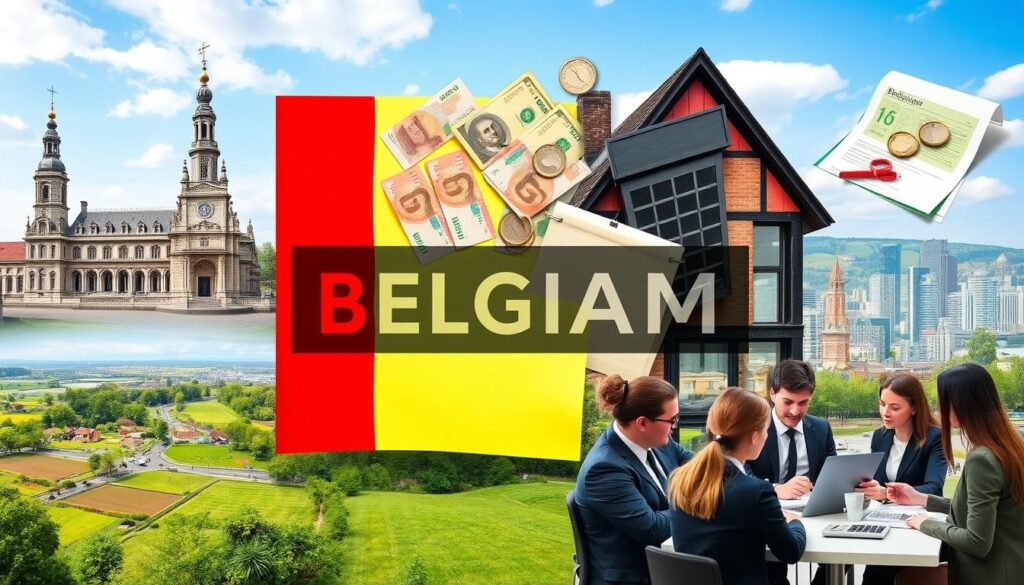
Belgium offers a range of financing options and housing assistance programs aimed at easing the process of homeownership for residents and investors alike. The diversity across regions like Flanders, Wallonia, and Brussels ensures targeted support mechanisms that reflect the unique needs of each area.
Government Housing Assistance
Government housing assistance programs in Belgium cater to various income groups, ensuring equitable access to housing. In Brussels, the introduction of an exemption on registration tax up to €200,000 replaced earlier mortgage tax reductions, providing substantial relief to new buyers3. Similarly, Flanders and Wallonia have rolled out incentives such as bonus premiums and tax credits to support low-income residents in acquiring or renovating their homes3. This focus on regional programs highlights a commitment to address specific local challenges.
Financial Aid for Low-Income Buyers
To promote homeownership among low-income groups, Belgium has introduced robust financial aid mechanisms. Various financial aid for buyers includes subsidies, tax exemptions, and low-interest loans3. Financial aid for buyers in Flanders includes significant bonus premiums, while Wallonia offers tax credits that ease the cost burden. With these initiatives, the government aims to make homeownership achievable for more residents.
For more information on obtaining residence permits through investment programs in Belgium, refer to the Belgium Golden Visa program3.
| Region | Average Price per m² | Incentive Program | Registration Tax |
|---|---|---|---|
| Brussels | €2,500 – €5,50016 | Registration tax exemption | Up to €200,000 exemption16 |
| Flanders | n/a | Bonus premiums | 6% for family homes3 |
| Wallonia | n/a | Tax credits | 6% with €20,000 exemption3 |
Legal and Administrative Considerations for Foreign Buyers
When engaging in Belgian real estate transactions, foreign investors must be acutely aware of the legal considerations for foreign property owners. One of the key aspects includes understanding the Belgian Foreign Direct Investment (FDI) screening mechanism that was implemented in November 2022. This mechanism, inspired by EU Regulation 2019/452, focuses on balancing openness to foreign investments with the protection of national security and public order, only blocking investments in exceptional cases17. Moreover, acquisitions of at least 25% or 10% of voting rights in entities connected to critical infrastructures, essential technologies, raw materials, defense, energy, and cybersecurity are subject to the FDI screening regime17.
A critical administrative requirement in Belgian real estate transactions is obtaining the necessary permits and authorizations from local authorities, which may vary depending on the location and type of property being acquired18. Foreign buyers might face specific regulations and limitations, including potential restrictions dictated by regional authorities in areas like the Region of Flanders, which has its own screening mechanism aimed at safeguarding public strategic interests17.
It is highly recommended that international buyers engage a local lawyer to navigate these complex processes. From securing permits and performing title searches to verifying transaction integrity, having local legal expertise ensures compliance with Belgium’s intricate legal framework and administrative procedures surrounding property acquisitions18. Additionally, while owning property in Belgium does not grant residency by investment, it can bolster residency applications by demonstrating a tangible commitment to the country’s residency requirements18.
Contact us if you are Interested in Buying Property Abroad!
FAQ
Can Foreigners buy Real Estate in Belgium?
Yes, foreigners can buy real estate in Belgium. There are no restrictions on non-citizens purchasing property. The conditions for property ownership are equitable for both residents and non-residents.
What are the property ownership rules for expats in Belgium?
Expats have the same legal rights as Belgian citizens when it comes to owning property in Belgium. They can purchase various types of properties, including off-plan homes, new-builds, and furnished apartments.
What are the key steps in the property purchase journey for international buyers?
The purchase journey involves several steps, including making an offer, hiring a notary, arranging a survey, exchanging contracts, paying a deposit, and finalizing the arrangements with the notary to execute the deed of sale.
What are the costs and taxes associated with buying property in Belgium?
Buyers should budget for 11-15% of the property price for transaction costs, including registration taxes, which vary regionally. New properties incur a 21% VAT instead of registration taxes. There are also ongoing property taxes based on estimated rental values.
What is the process for foreigners obtaining a Belgian mortgage?
Foreign investors can access mortgages in Belgium, with lenders offering both fixed and variable rates. The amount that can be borrowed depends on the borrower’s financial status, with a minimum down payment of 10% usually required.
What insights can you share about the Belgian real estate market?
The Belgian real estate market is resilient, showing rising prices since mid-2014. There are regional disparities, with notable price increases in the Brussels-Capital region, Flanders, and Wallonia.
What are popular Belgian cities for property investment?
Popular cities for property investment include Brussels, Antwerp, Ghent, and Bruges, each known for distinct characteristics like international appeal, commercial vibrancy, historic allure, and cultural tourism respectively.
Are there any government housing assistance or financial aid programs in Belgium?
Yes, various regional programs offer incentives and subsidies to low-income residents for property acquisition or renovation. For example, the Brussels region offers an exemption on registration tax up to €200,000.
What legal and administrative considerations should foreign buyers be aware of?
Foreign buyers should be well-versed in local statutes surrounding property acquisitions, including zoning regulations and construction permits. Hiring a local lawyer can be invaluable for securing permits, performing title searches, and verifying transactions.
Source Links
- https://www.expat.com/en/guide/europe/belgium/18987-buying-a-property-in-belgium.html
- https://www.rsm.global/belgium/en/service/real-estate-management/acquiring-belgian-real-estate
- https://www.expatica.com/be/housing/buying/buying-a-property-in-belgium-106778/
- https://www.expatfocus.com/belgium/guide/belgium-buying-property
- https://www.expatica.com/be/housing/housing-basics/belgium-housing-106777/
- https://investropa.com/blogs/news/belgium-us-citizen-property-ownership
- https://multilaw.com/Multilaw/Multilaw/RealEstate/Real_Estate_Guide_Belgium.aspx
- https://www.landcentury.com/international/belgium
- https://www.grannville.com/post/foreign-investors-buying-property-in-belgium-guide
- https://finance.belgium.be/en/private-individuals/property/selling-buying/registration-duty/wallonia
- https://www.dlapiperrealworld.com/export/sites/real-world/guides/downloads/Belgium-Investment-Guide.pdf
- https://www.jll.be/en/trends-and-insights
- https://www.lexology.com/library/detail.aspx?g=1db827bd-a59c-4031-acb2-46d524e5f391
- https://www.linklaters.com/insights/publications/2023/january/belgium-real-estate-horizon
- https://www.mtfxgroup.com/post/guide-for-canadians-buying-property-in-belgium/
- https://investropa.com/blogs/news/belgium-real-estate-foreigner
- https://iclg.com/practice-areas/foreign-direct-investment-regimes-laws-and-regulations/belgium
- https://www.eui.eu/Documents/DepartmentsCentres/Law/ResearchTeaching/ResearchThemes/EuropeanPrivateLaw/RealPropertyProject/Belgium.PDF

Comments